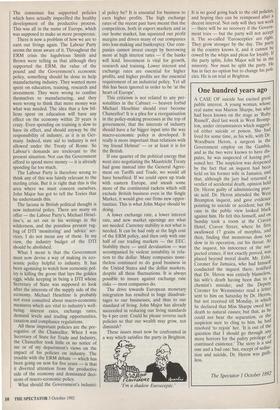One hundred years ago
A CASE OF suicide has excited great public interest. A young woman, whose real name was Marion Sharpe, but who had been known on the stage as 'Ruby Russell', died last week in West Bromp- ton, under circumstances which suggest- ed either suicide or poison. She had lived for some time, as his wife, with Dr. Woodburn Heron, a surgeon in the Government employ on the Gambia, and as the two were known to have dis- putes, he was suspected of having poi- soned her. The suspicion was deepened by the fact that an inquest had been held on his former wife in Jamaica, and that, although the jury had returned a verdict of accidental death, opinion held Dr. Heron guilty of administering prus- sic acid. Dr. Heron attended the West Brompton inquest, and gave evidence pointing to suicide or accident; but the case in the public view looked black against him. He felt this himself, and on Sunday took a room at the Craven Hotel, Craven Street, where he first swallowed 17 grains of morphia, and then, finding that monstrous dose too slow in its operation, cut his throat. At the inquest, his innocence of the sus- pected crimes, if not exactly proved, was placed beyond moral doubt. Mr. Erlst, Coroner for Jamaica, who had himself conducted the inquest there, testified that Dr. Heron was entirely blameless. his wife's death having been due to a chemist's mistake; and the Deputy Coroner for Westminster read a letter sent to him on Saturday by Dr. Heron. but not received till Monday, in which he declared that Miss Sharpe owed her death to natural causes; but that, as he could not bear the separation, or the suspicion sure to cling to him, he had resolved 'to rejoin' her. 'It is out of the question that I should go through any more horrors for the paltry privilege of continued existence.' The story is a sad one and a bad one; but, except of seduc- tion and suicide, Dr. Heron was guilt- less.
The Spectator 1 October 1892


















































 Previous page
Previous page